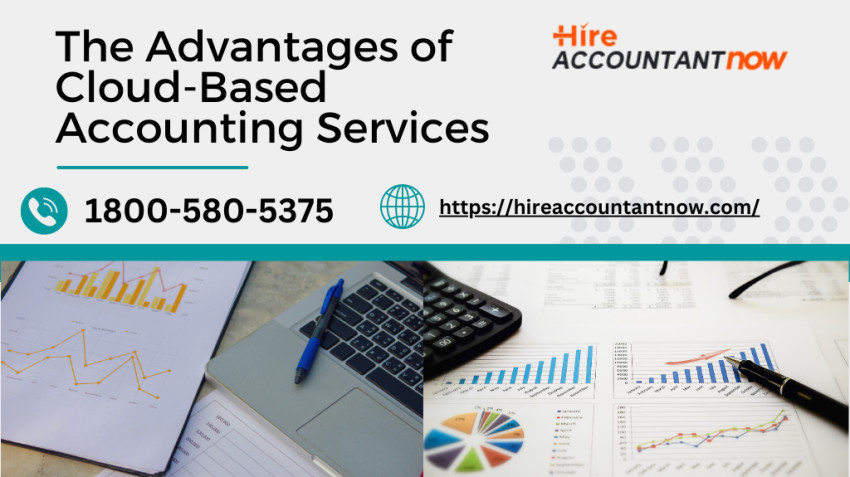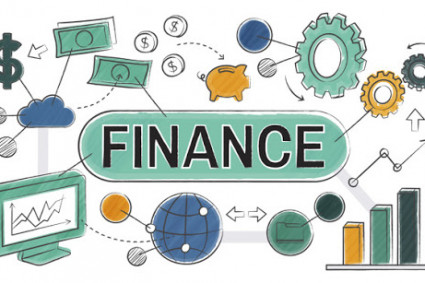
Imagine a universe where accessing financial information is simple and secure while also being shared among parties managing it collaboratively without reliance on conventional methods. Accounting services based on the cloud provide this very reality. By embracing cloud technology for your accounting needs, as detailed in this article, you can enjoy numerous advantages that transform the way businesses handle financial data.
Cloud-based accounting services have become a key driver in transforming businesses, irrespective of their size, as cloud-based systems provide organizations with the ability to safely and efficiently access their financial data at all times and from any location. Why cloud-based accounting is becoming increasingly popular among businesses worldwide and its advantages should be examined
What is cloud-based accounting?
Without understanding what cloud-based accounting is, it's hard to appreciate its advantages. Financial data can be stored and managed remotely via cloud-based accounting instead of being kept solely on a local computer or network. Online access to accounting software and data eliminates the need for maintaining physical infrastructure or performing manual updates.
Advantages of Cloud-Based Accounting Services
Accessibility and flexibility
The accessibility provided by cloud-based accounting allows businesses to obtain their financial information on any Internet-ready device. Managing accounts and making informed decisions has never been easier with the flexibility to do so on-the-go without being tied down to one location.
Cost Efficiency
One may incur significant expenses in installing and maintaining conventional accounting software. However, the usage of cloud-based accounting services eliminates the necessity for costly equipment spending such as hardware and infrastructure, in addition to avoiding the inconvenience caused by manual software upgrades. For an expected monthly cost, companies are able to register themselves on a cloud-based account platform, thus decreasing initial expenses and developing adaptability as they progress.
Real-Time Collaboration
Simplified collaboration is a benefit of cloud-based accounting, as simultaneous access to the accounting system by multiple users allows for seamless collaboration between team members as well as between accountants and stakeholders. Improved productivity is guaranteed with this real-time collaboration, which eradicates any version control concerns while also simplifying communication processes so that everyone can remain up-to-date.
Data Security and Backup
Preserving data security is a primary concern for businesses to ensure that your financial information stays private and secure against hacking and cybercrime. To guarantee data safety in cloud-based accounting services, important security measures such as firewalls and encryption are implemented for proper data backup. The use of cloud-based solutions that are robust and secure is a reliable way to address the vulnerability of traditional systems to physical threats while enhancing security against unauthorized access.
Scalability and integration
Accounting solutions must be scalable to keep up with growing companies. Cloud-based accounting services allow businesses to grow seamlessly by providing flexible solutions. Integrating additional users or incorporating various business apps on cloud-based platforms is a hassle-free experience that doesn't cause any disturbance.
Automatic Updates and Maintenance
To keep your accounting system current may require lots of effort in terms of both time and resources, but with cloud-based accounting in place, you can enjoy automatic and hassle-free updates. Thanks to service providers handling system maintenance tasks like software updates and security patches in an automated manner behind-the-scenes, your accounting software remains current regarding its functionality and adheres to regulatory standards.
Streamlined Workflow
Efficiency is increased as repetitive processes are automated with cloud-based accounting, making workflow more streamlined. Automated tedious tasks, including generating invoices or tracking expenses, and completing reports around finances or reconciliations, allow for less human error while giving you extra time for proactive thought around crucial decision-making.
Enhanced Data Accuracy
Precise financial data is necessary to make knowledgeable business choices. When utilizing a cloud-based accounting system, the chances of human errors stemming from manual input or spreadsheet use are limited. Through the integration of bank feeds and other data sources into cloud-based systems, it is possible for these platforms to automatically fetch all transactions while ensuring that your financial reports are always up-to-date.
Environmental Benefits
Cloud-based accounting is an environmentally friendly approach to managing financial information, and a significant reduction in greenhouse gas emissions is possible for businesses that adopt a strategy involving less physical infrastructure usage alongside the paperless operation of processes and better remote working policies. The use of cloud technology is in line with our values of promoting sustainability and social responsibility.
Understanding the Role of an Accountant in Business Growth
An organization cannot thrive without reliable and competent accountants, whose duties include maintaining accurate financial records as well as analyzing data to deliver crucial financial information needed to make decisions. They have to fulfil additional responsibilities apart from the basic ones by providing vital advice and guidance that enable organizations to keep up with the fast pace of change in the marketplace. Accountants make a significant contribution to business expansion.
Financial recordkeeping and reporting
The precise recording and organization of financial transactions fall within the scope of an accountant's duties. In addition, a detailed analysis of finances is provided by preparing documents like balance sheets and income statements, as well as cash flow reports.
Budgeting and forecasting
Planning for resource allocation is made easier for organizations with the expert involvement of accountants in their budgeting and forecasting activities. Additionally, market trend analysis of historical data by the accountant offers insights on revenue projections, including cost estimation, to identify profitable areas.
Tax compliance and planning
Accountants play a role in ensuring that businesses comply with tax laws and regulations. As part of their role, they manage all aspects related to tax planning, such as return filing, and seek avenues for potential savings through minimal taxation in order to ensure maximum allocation of finances.
Financial analysis and decision-making support
Providing insight into decision-making is part of what accountants do as they analyses financial data and identify trends. Through conducting thorough financial analysis, they generate insights about investment opportunities, which then inform their recommendations for project viability.
Risk management
Mitigation of financial hazards entails the assessment of these hazards themselves, something that accountants do. Their task is to locate potential weak spots, such as fraud or incompliance, and then set up internal checks in order to maintain asset protection while ensuring the integrity of finances.
FAQs:
Is cloud-based accounting suitable for small businesses?
Absolutely! For small businesses looking to manage finances efficiently with anytime access to data and cost-effective options, cloud-based accounting is the answer.
How secure is cloud-based accounting?
To ensure the protection of confidential financial information from unauthorized access or hacking activities, cloud-based accounting services utilize cutting-edge technologies such as encryption methods, firewall applications, and reliable data backup systems. Service providers prioritize investing in advanced technology to secure data and maintain its integrity.
Can multiple users access cloud-based accounting simultaneously?
Collaboration and real-time updates are facilitated by cloud-based accounting, as multiple users are able to access the system simultaneously.
Do cloud-based accounting services provide customer support?
Most cloud-based accounting service providers have got your back with dedicated customer support designed to keep you up-to-date.
Is cloud-based accounting compliant with financial regulations?
Cloud-based accounting platforms abide by stringent security and compliance guidelines set forth by financial regulations, ensuring a secure and lawful accounting solution is provided for businesses.



